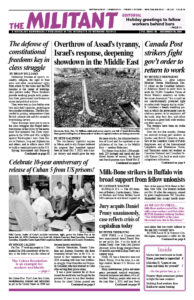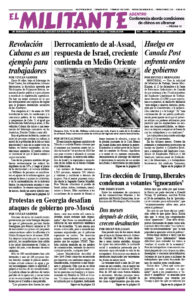South Korea’s political crisis — triggered by a short-lived move by then President Yoon Suk Yeol to impose martial law — entered a new stage Dec. 14 as he was impeached by the National Assembly. Over 200,000 people protesting outside the parliament in Seoul cheered at the news.
Demonstrators, old and young, had rallied daily in the nation’s capital with signs like “Impeach Yoon, ringleader of insurrection!” He had sprung his emergency decree on the polarized country Dec. 3, citing threats from “anti-state forces.” He was reacting to moves by liberal bourgeois parties that had deadlocked the parliament, paralyzing his scandal-plagued and increasingly unpopular conservative government.
His martial law decree banned all political activity, strikes and “gatherings that incite social unrest” and would have put the country under military rule for the first time in 45 years. Mighty political protests, including by members of his own party, led him to back off.
Martial law is ‘war on the people’
“This is the happiest moment in my life,” Kim Myoung-sook, 60, told the New York Times at the huge rally demanding impeachment. “Martial law is a declaration of war on the people.”
Protests had continued daily demanding Yoon step down. The Korean Confederation of Trade Unions, which has 1.2 million members, called for an indefinite general strike “until Yoon’s government steps down.” This defiant opposition by working people strengthened the parliamentary vote to rescind his decree. Members of the Korean Metal Workers Union held two-hour strikes at GM Korea, Hyundai Motor and other factories Dec. 5. The Korean Railway Workers’ Union also walked out that day.
On Dec. 11 tens of thousands of metal workers union members struck for four hours at Kia Motors and other plants to join a rally to demand that Yoon resign. The next day 10,000 Confederation of Trade Union members rallied in the capital, marching to the presidential residence calling for Yoon to quit. Millions of unionists know how martial law targets their organizations and hard-won rights.
With Yoon’s impeachment, the prime minister, Han Duck-soo, assumed interim presidential powers.
Some of Yoon’s closest advisers have resigned or been arrested. Prosecutors are also weighing criminal charges of insurrection against him.
Yoon won’t actually be removed from office until the country’s Constitutional Court certifies the impeachment vote. If it is upheld, presidential elections will occur within 60 days.
Decades of conflict over military rule
At the end of World War II the Korean people rose up after four decades of Japanese colonial occupation. Under a deal between President Franklin Roosevelt and Soviet Premier Joseph Stalin, the country was divided in half, with the Red Army entering the north.
In the south a powerful revolutionary upsurge was crushed under U.S. occupation forces, which installed a brutal landlord-capitalist regime. Washington brought back from U.S. exile Syngman Rhee, who assumed dictatorial power.
The 1950-53 U.S.-led Korean War, carried out under the blue helmets of the United Nations, laid waste to the peninsula and killed millions of Korean people. Backed by the People’s Republic of China, North Koreans fought the U.S. to a stand off, leading to an end of the war. To this day Washington has refused to sign a peace treaty formally ending the war.
Over the following decades, rebellions by workers and peasants were murderously suppressed by military dictatorships in South Korea, backed by Washington. The last of these authoritarian regimes was toppled at the end of the 1980s.
The U.S. rulers are concerned about the political instability of one of their key allies in the Pacific, which is Asia’s fourth-largest economy. It reflects intensifying crises, conflicts and rivalries among capitalist powers across the world. These are especially sharp in East Asia over the flashpoints of Taiwan and the divided Korean Peninsula.
Washington, with more than 28,000 U.S. troops stationed in South Korea, had to postpone planned joint military exercises as the governmental crisis unfolded.

